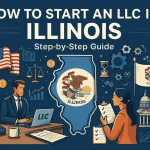If you’re looking to form a Georgia LLC, here are the steps you need to follow:
1. Name Your Georgia LLC
Choose a unique name that isn’t taken by another Georgia business. Use the Georgia Secretary of State’s business search to check availability. Your name must include “Limited Liability Company,” “LLC,” or “L.L.C.” and avoid restricted words (or get necessary approvals for them). If you have a name in mind but aren’t ready to file, you can reserve it for 30 days for $25, though most skip this and go straight to filing when ready.
2. Appoint a Registered Agent
Georgia requires an LLC to have a registered agent in the state. The agent can be an individual Georgia resident or a business entity authorized to do business in Georgia, with a physical Georgia address. They will receive official legal and state documents for the LLC. You (the business owner) can act as the agent if you have a Georgia address and are generally available during business hours, or you can hire a registered agent service. You’ll list this agent’s info in your formation paperwork.
3. File Articles of Organization
Submit the Articles of Organization to the Georgia Corporations Division. This can be done online or via mail. The filing fee is $100 online (or $110 by mail). In the Articles, you need to provide:
- LLC name,
- Name and address of the registered agent,
- Name and address of the LLC’s organizer (the person filing the paperwork),
- An email address (for official correspondence and annual registration notices). Georgia’s online filing system will prompt you for required info. Once filed, processing is usually quick (often 5-7 business days online). If you mail it in, include a Transmittal Information Form. After approval, you’ll get a Certificate of Organization confirming your LLC’s existence.
4. Draft an Operating Agreement
While not required to be filed with the state, an operating agreement is an important internal document for your Georgia LLC. It sets out the structure and rules of your LLC, such as who owns what percentage, how decisions are made, how profits and losses are divided, and what happens if someone leaves or if the business closes. Georgia law will govern by default if you don’t have one, but having your own agreement gives you control. It’s highly recommended for multi-member LLCs and still useful for solo operations.
5. Get an EIN
Apply for an EIN from the IRS for your LLC. You can do this online and receive it immediately. Your EIN is needed for tax filings (federal and possibly state), opening bank accounts, and hiring employees. Even if you operate alone, an EIN allows you to keep your SSN off business documents and indicates to others that your business is properly established.
6. Open a Business Bank Account
Take your approved Articles of Organization and EIN to a bank to open a business bank account. Separating business finances from personal ones is critical for protecting your liability shield and for clear accounting. Georgia has many regional banks and national banks; pick one that suits your needs (consider factors like fees, online banking, branch convenience, etc.).
7. Georgia Business Licenses and Taxes
Georgia doesn’t have a statewide general business license, but depending on your location and industry, you might need local licenses. Check with your city or county government for a business occupational tax certificate (business license) requirements. For example, Atlanta and many other cities/counties require a basic business license. On taxes: Georgia LLCs (by default taxed as pass-through entities) won’t pay state income tax at the entity level, but members will pay state income tax on their share of the income. You’ll need to file state tax returns for your personal income (or corporate if you elect corporate taxation). If selling goods, register for sales and use tax with the Georgia Department of Revenue. If you have employees, register for withholding and unemployment taxes with the Georgia DOR and Department of Labor respectively. Also, be mindful of industry-specific taxes or regulations (like if you’re selling alcohol, etc., there are additional steps).
8. File Annual Registration
Georgia requires an Annual Registration for LLCs. This is essentially an annual update of your LLC’s information (and a fee). The registration fee is $50 each year. It’s due by April 1 each year after the year of formation (you can file as early as January 1 for that year). If you form your LLC in, say, July, you still have to file the Annual Registration by the next April 1. You can file the annual registration online easily (and even file multiple years in advance if desired). Missing this can lead to late fees and eventually administrative dissolution, so mark it on your calendar.
Tip: For a hassle-free start, Registered Agents Inc. can take care of forming your Georgia LLC for you. They handle the state filing and can even act as your registered agent. Plus, they’ll remind you about your annual registration to keep you compliant. Set up your Georgia LLC with Registered Agents Inc.to save time and ensure everything is done right.
Final Thoughts
Georgia is a welcoming state for small businesses, with relatively low fees and straightforward requirements. By completing the steps above, you’ll have a legally formed Georgia LLC. Keep your business in good standing by filing your annual registration and addressing any necessary taxes or licenses. With the legalities handled, you can concentrate on growing your business across the Peach State. Good luck with your Georgia LLC!
Ready to start your Georgia LLC? Don’t wait – form your Georgia LLC now and launch your business with confidence!














